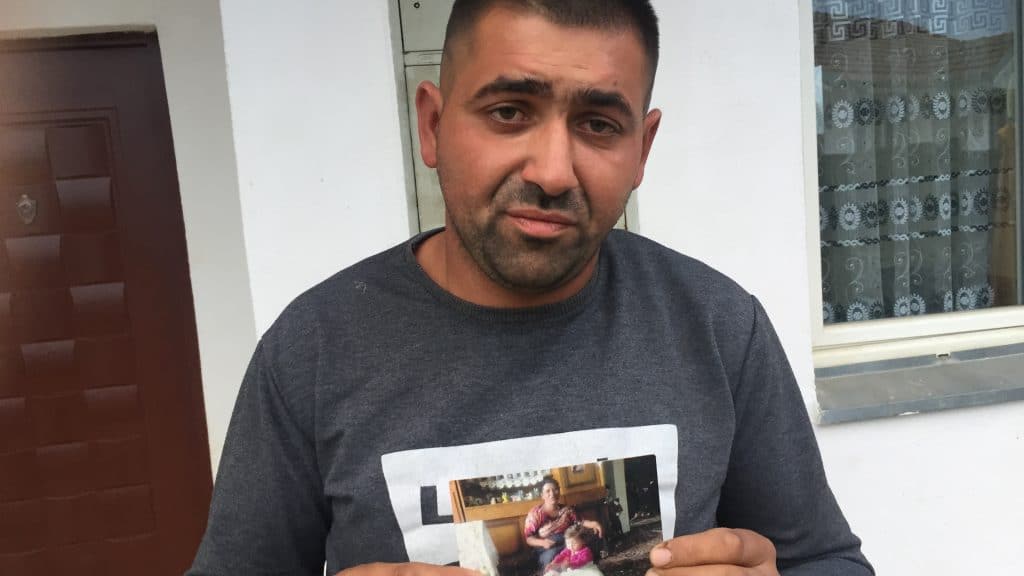
Kosovo Roma Woman ‘Died in Despair’ after War Rape Testimony
Haxhi Balaj remembers that it was sunny on May 5, 1999, and that his mother Shehrije was trying to find something for lunch for the family.
They had run out of flour, among the many other things they were missing in those difficult days during the Kosovo war.
His mother, a Roma woman, was in their house in the village of Bllagaje, in western Kosovo’s Peja/Pec municipality, when gunshots were heard. She told her children to stay in the house and not go outside.
A bit later, a Serbian police car entered their yard, and four uniformed police officer took her away to an unknown location. In the evening, she came back, bloodied and bruised all over her body.
In 2013, Shehrije Balaj became the first female witness from Kosovo to testify about how she was raped, giving evidence at the trial of former Yugoslav Army commander Toplica Miladinovic and 10 others in Belgrade for war crimes committed in the villages of Qyshk/Cuska, Pavlan, Zahaq and Lubeniq near the town of Peja/Pec, where at least 100 civilians were killed in April and May 1999.
The perpetrators were members of a 177th Yugoslav Army Unit known as the Jackals, commanded by Nebosoja Minic, alias ‘Dead’ (‘Mrtvi’ in Serbian). The Jackals were not created during the war in Kosovo; they had already committed massacres in Bosnia and Croatia.
Shehrije identified three of them in court – Srecko Popovic, Boban Bogicevic and Dejan Bulatovic. A group of Jackals fighters were initially convicted in Belgrade in 2014 and sentenced to a total of 106 years in jail, but the Serbian appeals court then reversed the verdict and the case is now being retried.
In the meantime, Shehrije Balaj died in poverty in September 2018, after suffering from various illnesses for many years.
The Belgrade court did not provide adequate protective measures for victims and witnesses at the Jackals trial, or give them adequate counselling or support, her son said.
In Kosovo, his mother was not given any help or economic support either. Her testimony about her rape did not attract any attention in her home country, and she was never added to the lists of any of the Kosovo NGOs that provide help for wartime rape victims.
She also did not manage to gain the status of victim of sexual violence, a Kosovo government scheme that allows survivors of to claim a monthly pension of 230 euros after they pass a verification process.
She filed an application but the government’s Commission to Recognise and Verify Survivors of Sexual Violence During the Kosovo War declined to confirm to BIRN whether it was reviewed or not.
Kosovo law offers survivor status to those who were sexually assaulted in the war between February 27, 1998, when the armed conflict started, and June 20, 1999, when Serbian forces withdrew from Kosovo following the NATO bombing.
But the law does not include pensions for families of the victims who died during the verification process or for relatives of those who died as a result of being assaulted.
“With the death of the victim, her right to status also dies,” Mirlinda Sada, the head of Medica Gjakova, an NGO that provides health and economic support for victims of sexual violence in the 1998-9 war in Kosovo told BIRN.
Sada said that the law could be amended in order to include those who have already died, but also to extend the five-year deadline for application.
She raised the issue of people who became victims of sexual violence twice over – Kosovo Albanians and Roma who were raped by Serbs during the war and Albanians immediately after the war.
“We have cases of victims raped by two sides – Serb armed forces and Albanians. We have also cases in which victims say that they were raped by Serbs but are afraid to tell that they suffered the same from Albanians,” she said.
‘The trauma of war was still with her’
Ardiana Shala, a researcher in social psychology with a focus on war trauma and rape, said that applicants for verified status have to endure long waiting periods until their application has been reviewed and decided upon.
She also said that by recognising only those who were subjected to sexual violence prior to June 20, 1999, the authorities are ignoring some victims’ suffering.
“It is assumed that most of the wartime rape victims who were raped after June 20 might belong to minority [non-ethnic Albanian] ethnic groups, and they should change the timeframe,” she argued.
Salih Nikci, who was a witness at the same trial of the Jackals as Shehrije Balaj, and testified twice at the Belgrade court about the murder of his parents and dozens of other civilians in the villages of Pavlan, Qyshk/Cuska, Zahaq and Lubeniq, feels that his testimony was not complete because he did not speak about the rapes that were committed.
“The most difficult part for men was to talk about the rape of women. All of us who testified knew about these cases but we couldn’t show all of them, even though we had the chance to speak about them all,” Nikci said.
However, two ethnic Albanian women who testified at the trial have obtained the status of wartime sexual victim.
Halit Gashi, another witness in the case against the Jackals, whose relatives were killed in Pavlan, said that Roma women who became victims of rape during the war, like Shehrije Balaj, did not receive the appropriate attention “because of their ethnic background”.
“I know about her case. It is a pity what happened to her during and after the war,” Gashi said.
Haxhi Balaj recalled how his mother’s health deteriorated further after she went to give testimony in court in Belgrade.
“She had many health problems; the trauma of war was still with her. She testified twice and it was very difficult for her,” Balaj explained.
“She travelled twice [to Belgrade to testify] and it was exhausting for her. Once she collapsed in the court and was taken to hospital. Dealing with those who raped her and revisiting the story in the courtroom was unbearable for her,” he added.
It remains difficult for the family to look back on his mother’s suffering, he added.
“She died in despair because nobody recognised or supported her, even though she testified in court about the rape,” he said.
Link: https://balkaninsight.com/2019/11/19/kosovo-roma-woman-died-in-despair-after-war-rape-testimony/








